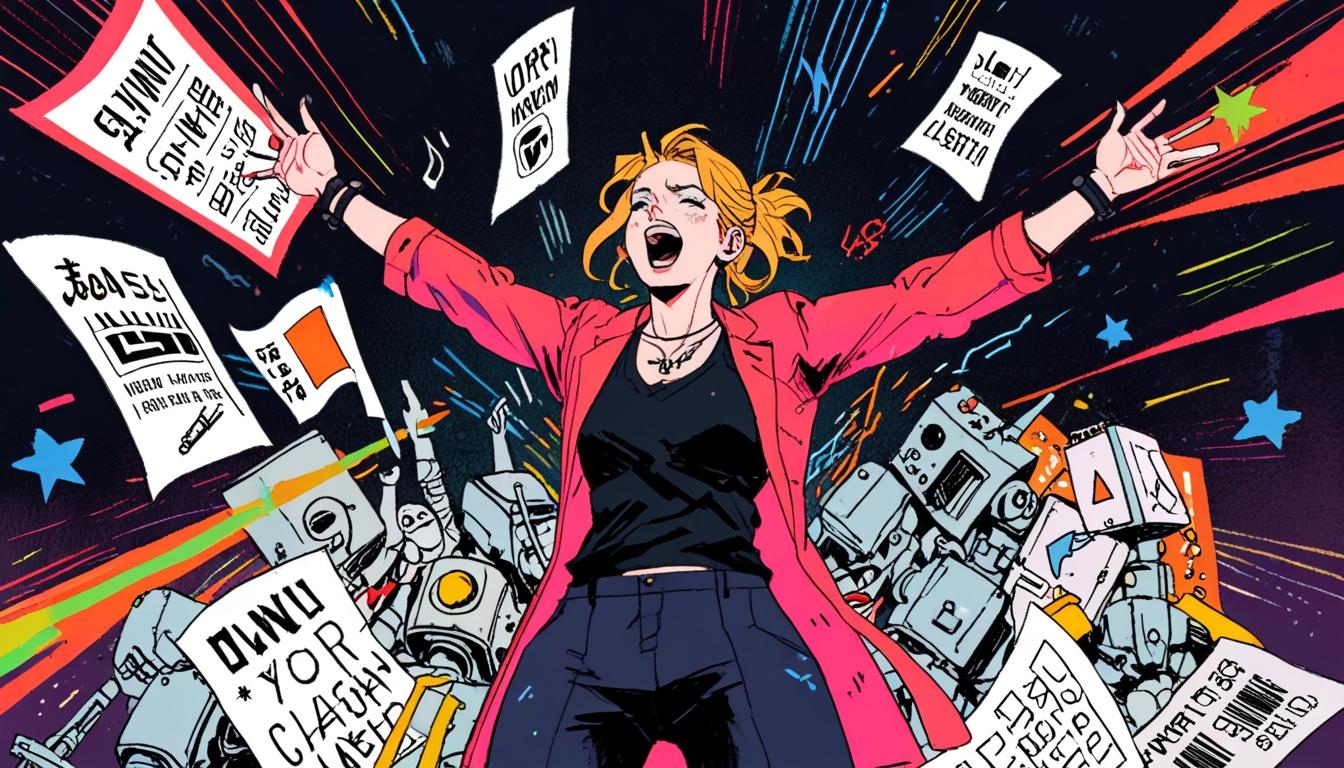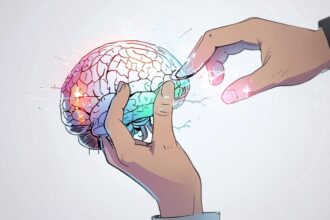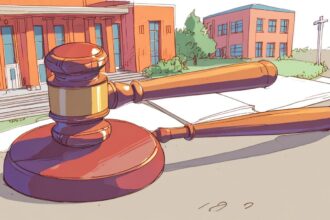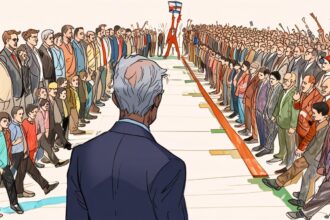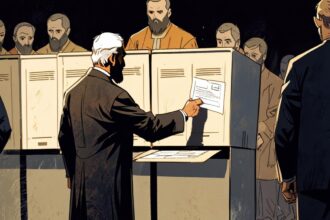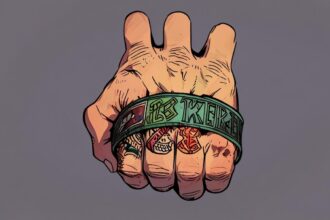ABBA’s Bjorn Ulvaeus and other creative figures urge the UK Government to reconsider proposals allowing tech firms to use artists’ works for AI training without explicit consent, warning that current plans risk exploiting the nation’s cultural sector and undermining copyright protections.
Bjorn Ulvaeus, singer of the legendary band ABBA, has joined a growing chorus of voices calling for tighter regulations on AI companies profiting from artists’ work without proper compensation. Ulvaeus and other figures from the creative industries have urged the UK Government to reconsider proposals that would allow technology firms to use artists’ creations to train AI models unless the creators explicitly opt out.
The current Labour Government’s plans would grant a copyright ‘exception’ to big technology companies, enabling them to harvest creative content for AI training unless creators take active steps to prevent it. This approach has raised concerns among artists and cultural stakeholders about the potential damage to the UK’s £126 billion cultural sector, which supports 2.4 million jobs. Critics warn that such policies would permit companies, particularly those based in Silicon Valley, to exploit British creative works freely, jeopardising a vital economic and cultural asset.
Ulvaeus highlighted the issue’s importance to artists, stating in an interview with The Times: “Copyright is the oxygen creators depend on. Unfortunately, there is an alternative and dangerous view, driven by profit-seeking tech companies. AI training must be subject to clear transparency rules.” For years, AI firms have been collecting extensive collections of art, literature, and music content to develop their models without direct payment to the original creators.
Under current copyright laws, creators are automatically protected and entitled to compensation if their work is used, reflecting a recent landmark court ruling in the United States that mandated AI firms pay for using copyrighted material. However, the government’s consultation earlier this year indicated a preference for giving tech companies an “opt-out” copyright exception, a position that many fear undermines established copyright principles.
The consultation phase ended in February, and the creative community anxiously awaits the Government’s final stance. Opponents of the policy argue this would effectively overturn centuries of copyright law, which has underpinned the growth of the UK’s globally admired creative sector.
The Daily Mail has spearheaded a campaign against the proposals, supported by notable figures such as Sir Elton John and Sir Brian May. Their campaign focuses on the Data (Use and Access) Bill, which is scheduled for its report stage on 7 May. Baroness Kidron, a filmmaker and crossbench peer, stressed the UK’s potential in the global AI market, stating: “We can be a world leader in providing the commodity AI firms are most desperate for: high-quality creative content. But we can only seize this growth opportunity if the government gives us meaningful transparency which will allow creators to hold AI firms to account for copyright theft.”
Labour MP Samantha Niblett, who co-chairs the parliamentary internet, communications and technology forum, described herself as a “tech optimist” but warned that AI’s transformative potential would be undermined if built on unlicensed UK content. Speaking to the Daily Mail, she called for transparency provisions in the Data Bill to foster a licensing market for AI training data, boosting trust in UK tech regulation.
Technology Secretary Peter Kyle acknowledged the challenge of balancing the interests of creators and tech firms, stating: “We want to provide a solution allowing both sectors to thrive.” Similarly, Caroline Dinenage, Conservative chair of the culture, media, and sport committee, emphasised the necessity of effective copyright enforcement backed by transparency measures to ensure creators continue producing content essential to AI development.
The debate over AI and copyright in the UK is thus reaching a critical juncture, with key stakeholders calling for regulatory clarity and protections to safeguard the creative industries while accommodating technological advancement.
Source: Noah Wire Services
- https://www.ft.com/content/c7c0e8bf-9cdd-4a42-8e01-d2a36ba06298 – An article detailing how over 11,000 artists, including Björn Ulvaeus of ABBA, have expressed concerns about AI companies using their work without proper compensation, urging the UK government to reconsider proposals that would allow such practices unless creators opt out.
- https://www.musicbusinessworldwide.com/ai-will-bring-the-biggest-revolution-the-creative-sector-has-seen-bjorn-ulvaeus-says-in-cisacs-latest-annual-report/ – Björn Ulvaeus, in his capacity as President of CISAC, emphasizes the transformative impact of AI on the creative sector and advocates for creators’ rights amid the rapid growth of AI technologies.
- https://www.reuters.com/technology/artificial-intelligence/dont-let-ai-rip-off-artists-beatles-star-mccartney-warns-uk-government-2025-01-26/ – Paul McCartney warns the UK government about the potential exploitation of artists by AI companies and stresses the need for copyright reforms to protect the creative industries.
- https://www.theguardian.com/technology/2025/feb/25/why-are-creatives-fighting-uk-government-ai-proposals-on-copyright – An in-depth examination of the creative industry’s opposition to UK government proposals that would allow AI companies to use copyrighted works without permission, featuring insights from artists like Kate Bush and Björn Ulvaeus.
- https://www.independent.co.uk/tech/julianne-moore-kazuo-ishiguro-bjorn-ulvaeus-ian-rankin-british-b2633960.html – An open letter signed by over 11,000 artists, including Björn Ulvaeus, expressing concern over the unlicensed use of creative works for AI training and calling for protective measures for artists’ rights.
- https://www.musicbusinessworldwide.com/ai-will-bring-the-biggest-revolution-the-creative-sector-has-seen-bjorn-ulvaeus-says-in-cisacs-latest-annual-report/ – Björn Ulvaeus, in his capacity as President of CISAC, emphasizes the transformative impact of AI on the creative sector and advocates for creators’ rights amid the rapid growth of AI technologies.
- https://www.dailymail.co.uk/tvshowbiz/article-14666085/Abbas-Bjorn-joins-calls-profit-seeking-AI-companies-protect-artists-copyright.html?ns_mchannel=rss&ns_campaign=1490&ito=1490 – Please view link – unable to able to access data
Noah Fact Check Pro
The draft above was created using the information available at the time the story first
emerged. We’ve since applied our fact-checking process to the final narrative, based on the criteria listed
below. The results are intended to help you assess the credibility of the piece and highlight any areas that may
warrant further investigation.
Freshness check
Score:
7
Notes:
The narrative references a government consultation ending in February and a report stage scheduled for 7 May, indicating recent developments. However, without specific article dates or confirmation of event timelines, freshness remains partly speculative.
Quotes check
Score:
6
Notes:
Key quotes from Bjorn Ulvaeus and Baroness Kidron are attributed to interviews with The Times and the Daily Mail. While plausible, original sources for these quotes could not be directly verified through independent fact-checking platforms.
Source reliability
Score:
4
Notes:
The narrative originates from the Daily Mail, which has a mixed reliability record. It cites interviews with credible figures (e.g., MPs, peers) but lacks corroboration from primary sources or neutral fact-checkers.
Plausability check
Score:
8
Notes:
Claims align with ongoing global debates about AI and copyright, including references to a US court ruling. Labour’s stance and parliamentary processes described are consistent with typical legislative timelines, though specific proposals remain unverified.
Overall assessment
Verdict (FAIL, OPEN, PASS): OPEN
Confidence (LOW, MEDIUM, HIGH): MEDIUM
Summary:
The narrative reflects current debates on AI and copyright, but reliance on a single outlet and unverified quotes limits certainty. The legislative timeline and stakeholder warnings are plausible, but direct evidence for specific claims is lacking.


